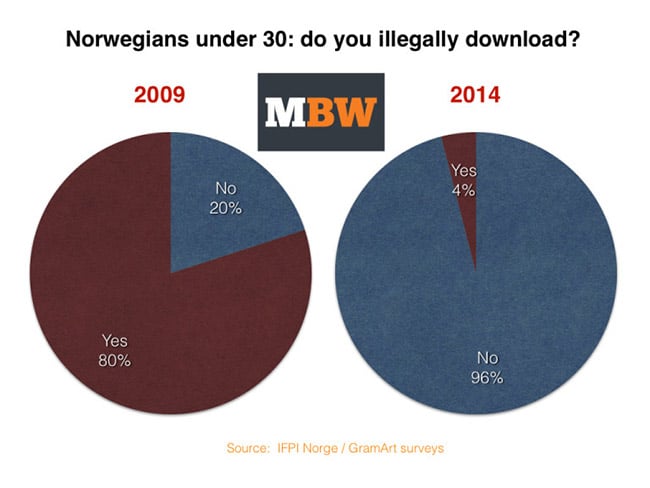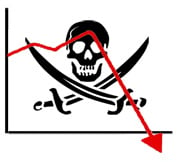Torrentfreak: “Spanish Government Orders Pirate Bay Blockade” plus 1 more |
| Spanish Government Orders Pirate Bay Blockade Posted: 27 Jan 2015 02:39 AM PST
After a serious of tweaks and adjustments to local copyright law, January 1st the country introduced tough new legislation backed up by hefty punishments for site operators. Potential €600,000 fines were enough to scare some sites offline. Others, such as Pablo Soto’s Torrents.fm, disappeared without comment. While the climate in Spain is clearly a different one in 2015, there are now fresh signs of a new crackdown. Spanish users of local ISP Vodafone have been reporting that their visits to The Pirate Bay are being redirected to a new URL – Castor.vodafone.es. Domain stats reveal that ThePirateBay.se and ThePirateBay.org are indeed two of the top referrers to that URL and that 100% of its traffic comes from Spain. When Vodafone users began accusing their ISP of blocking The Pirate Bay without a court order, local media approached Vodafone for comment. In a statement yesterday the ISP said it had no knowledge of any blockade. This morning, however, Vodafone changed its mind. The company now confirms it has received a blocking order from the Spanish government. Vodafone says that it has an obligation to comply with an order “issued by a competent authority”, in this case, the Ministry of Culture. “In the current Copyright Act, there is a list of authorities who can order the blocking of a website to comply with legislation. That’s what we did,” a source at the company said. Speaking with Gizmodo in Spain, Vodafone could not confirm the exact date when it began blocking the site but said it complied with the official request around Christmas. That would certainly fall into line with early problems experienced by some users. It is currently unclear whether other ISPs in Spain have received the same instructions from the Ministry of Culture since ThePirateBay.se remains accessible via all ISPs except Vodafone. Other major ISPs including Movistar and Orange say they cannot currently confirm if they have received similar blocking instructions from the government. Today The Pirate Bay remains non-functional as a torrent site but its landing page, currently adorned with a phoenix, suggests a return to glory this coming weekend. If it does, Vodafone users will need a workaround. Source: TorrentFreak, for the latest info on copyright, file-sharing, torrent sites and anonymous VPN services. |
| Unprecedented Music Piracy Collapse Fails to Boost Revenues Posted: 26 Jan 2015 10:43 AM PST
To date and despite various threats not a single file-sharer has been prosecuted. No sites – not even the Pirate Bay – have been blocked. However, news coming out of Norway suggests that at least as far as the music industry goes, those legislative weapons are now obsolete. During December 2014 music industry group IFPI conducted a nationwide survey among under 30-year-olds and discovered some amazing things about the piracy landscape in Norway. According to the survey results, just 4% of respondents are now using illegal file-sharing platforms to obtain music. While that figure is certainly impressive, MBW compares that finding with the results of a similar 2009 IFPI survey which found that a huge 70% of the population under 30 used those platforms to obtain music.  The drop is certainly dramatic, especially when coupled with the fact that less than 1% of respondents now cite file-sharing networks as their main source of obtaining music. What is telling, however, is that IFPI Norway chief Marte Thorsby did not connect the drop with anti-piracy measures. "We are now offering services that are both better and more user-friendly than illegal platforms. In [the past] five years, we have virtually eliminated illegal file sharing in the music industry," Thorsby said. The December survey also found that 80% of under 30-year-olds now use streaming services as their main source of music. "Younger audiences are using streaming services to the greatest extent. When older audiences [start] embracing these services we will probably see a somewhat different distribution of revenues,” Thorsby told MBW. “Hopefully this will also involve a better economy for several Norwegian artists and record companies.” But while the drop in piracy will certainly be welcomed by the industry, it appears young people fleeing file-sharing networks has done nothing to boost revenues. In 2009 revenues were NOK 592 million ($75.94m) yet by 2014 there had only been a modest increase to NOK 601 million ($77.1m). That’s just a 1.5% uplift in five years, not accounting for inflation. Place that into the equation and in real terms revenues are down. That being said, that particular period witnessed a dramatic change in the supply model, with physical giving way massively to digital purchases. In 2009 just 15% of content was supplied in digital format but by 2014 that had reached 86%. For IFPI to claim the virtual elimination of music piracy is certainly an important if not unprecedented event but the take-home is simple. Provide people with effective and engaging legal alternatives and piracy becomes irrelevant. Source: TorrentFreak, for the latest info on copyright, file-sharing, torrent sites and anonymous VPN services. |
| You are subscribed to email updates from TorrentFreak To stop receiving these emails, you may unsubscribe now. | Email delivery powered by Google |
| Google Inc., 1600 Amphitheatre Parkway, Mountain View, CA 94043, United States | |

